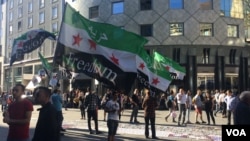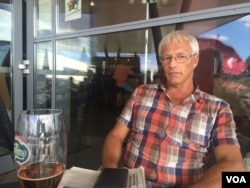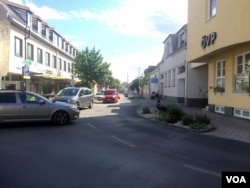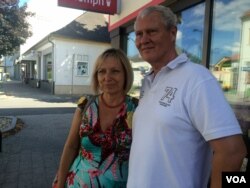In central Europe, one hears the word "Nazi" more often now than even a year ago in reference to the rise of far-right political parties.
Also heard is the word "terrorist" in reference to fears that terrorists may be lurking among refugees.
And while refugees and the far right are on opposites ends of Austria’s increasingly polarized society, they have at least one thing in common: They feel entirely misunderstood.
“Are Americans saying we are all Nazis now?” joked Markus Klaudusz, a locksmith, as we joined him at a cafe outside a supermarket in Ganserndorf, a tranquil town about 20 kilometers from Vienna.
The far right will soon have another shot at the presidency in Austria, and while Klaudusz is thrilled at this very real prospect, he is disturbed by the comparison. Leaders of the rising right are uniformly anti-immigrant and in some cases openly xenophobic and Islamophobic, but they have not suggested mass murder or empire expansion.
And while supporters include hate groups, they include a growing number of ordinary working people who have long felt ignored and dismissed by authorities.
“We had a peaceful demonstration, and activists from the left threw rocks at us,” Klaudusz said. “If it was supporters of the far right that attacked a peaceful march, it would be splashed in the headlines.”
Last week, an Austrian court overturned the results of a May presidential election that the leftist Green Party narrowly won. Now, the Freedom Party has another chance to win the European Union’s first far-right presidency in a fall rerun.
“I believe Hofer when he speaks,” said Klaudusz, referring to Freedom Party candidate Norbert Hofer. “He understands what normal people need, and he cares about Austrian people first.”
Refugee fears
In a picturesque Vienna town square on Sunday, a small crowd of Syrian refugees gathered near a giant poster on the ground showing thousands of pictures of children who have died in Syria.
“Every day there are terrorist attacks, and every day children are killed,” said Yaser, carrying a Syrian flag with “freedom” written on it in English and Arabic.
When asked how they felt about the rising far right, most didn't want to talk about it.
“We just want to study and, when the war ends, go home,” said Omar, 21, who fled his home about nine months ago. “All of these people will go back after the war. Syria is the most beautiful country in the world.”
Growing up with and later fleeing an authoritarian regime make many refugees nervous about saying anything publicly against the powerful, said Yamen, a 25-year-old Syrian who has been in Austria for two years.
“We just want to be safe,” he said. “The right says, ‘We don’t need refugees.’ They don’t know we only came here because of the war.”
Only extreme choices
In the coming election, many people feel they are choosing between two extremes with whom they disagree.
The overturned election results last week were from Austria’s second round of voting. In the first round, no group won a majority, but the Freedom Party received the most votes. The left-wing Greens came in second.
Green Party-backed Alexander Van der Bellen won the runoff by only 1 percent, calling himself “the child of refugees” and supporting gay marriage in a relatively conservative country.
The main promises made by the Freedom Party’s Hofer is to implement dramatic immigration reform and to “put Austrians first.” And while he presents himself as a centrist with confidence and charm, his party is led by the more extreme Heinz-Christian Strache, who has called for border fences to keep refugees out and says radical Islam is the new fascism.
Outside a clothing shop on the other side of Ganserndorf, Thomas Braun, an off-duty police officer, and his wife, Brigitte, said they would vote for Hofer even though they voted for Van der Bellen in the nullified election.
“A vote for Hofer is a vote against the government,” Thomas Braun said. “We don’t agree with 100 percent of his views, but we can vote for him because knowledge of history will prevent this country from ever returning to 1938.”
The memory of far-right leadership at that time, he said, is why Austria can vote for the far right without repeating the tragedies of World War II.
Inside the store, a woman named Heidemarie sells swimsuits, stockings and pajamas. She doesn’t know whom she is voting for yet because she dislikes them both. It is possible that both candidates would swing to the center upon taking office, she added, but unlikely.
“If I could vote not to have a president,” she said. “I’d vote for no president at all.”
European Union blues
Besides feeling misunderstood, far-right supporters and refugees have in common a growing distrust of the European Union.
To the horror of many refugees, the EU patchwork plan to curb the migrant crisis has resulted in a human rights crisis with tens of thousands of people stuck in camps in Greece. EU rhetoric, once brimming with sympathy for refugees, is more often these days about keeping them out or sending them back.
At the cafe, Klaudusz said many Europeans blame the crisis squarely on the European Union. German Chancellor Angela Merkel, one of the EU's most powerful figures, encouraged refugees to come to Europe and then the continent largely ignored existing refugee laws, letting travelers pass through their first country of entry without applying for asylum.
If those laws had been enforced, in theory, most of the refugees in Europe would have applied for asylum in Italy or Greece, and Austria would not now be hosting 90,000 new arrivals since 2015.
Coupled with terrorist attacks, the EU migrant crisis failure (or empathy, depending on how one sees it) has raised the profile of the far right across Europe, and more and more people fear terrorists among immigrants, strained resources and unfamiliar customs.
Last month, Britain voted to leave the EU, and far-right politicians in several other countries have campaigned for similar referendums.








